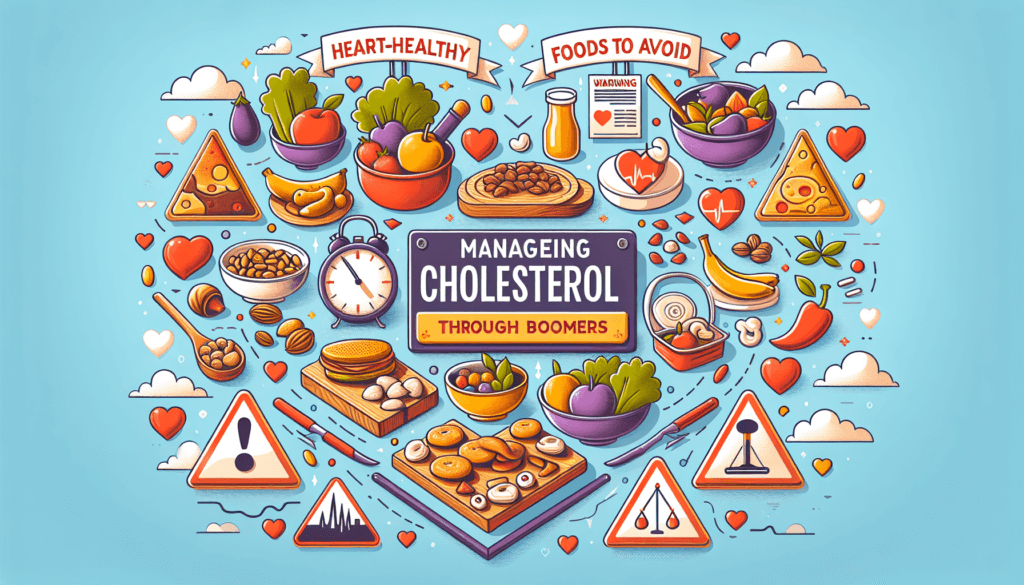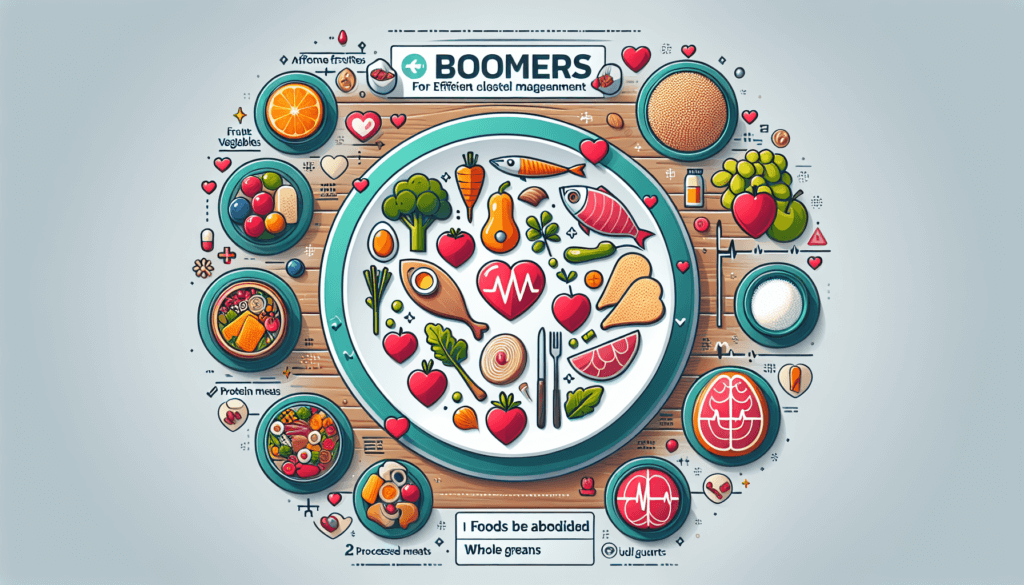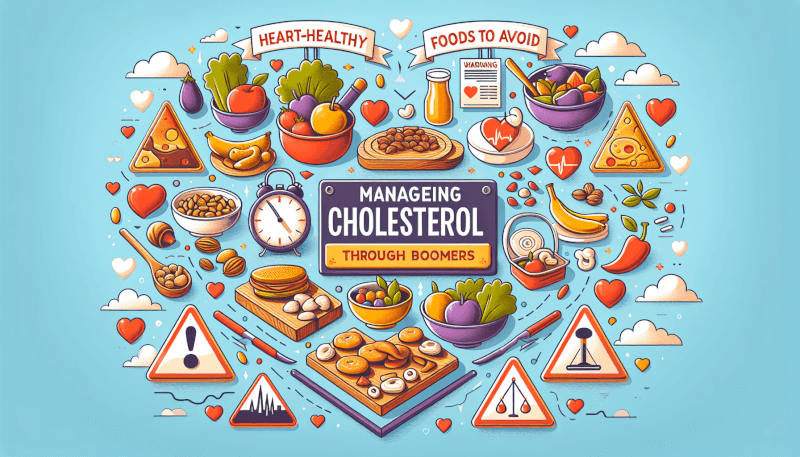Managing cholesterol levels is an essential aspect of maintaining good heart health, especially for boomers. With age, the body’s ability to regulate cholesterol decreases, making it crucial to adopt a healthy diet that can help keep it in check. In this article, we will explore the dietary recommendations specifically designed for boomers to manage cholesterol levels effectively. We will delve into the importance of incorporating heart-healthy foods, limiting saturated and trans fats, and maintaining an overall balanced diet. By following these guidelines, boomers can take proactive steps towards a healthier lifestyle and reduce the risk of heart-related complications.

Understanding Cholesterol
Cholesterol is a waxy, fat-like substance that is found in every cell of your body. It plays a vital role in various bodily functions such as hormone production, digestion, and the formation of cell membranes. However, having high levels of cholesterol can be detrimental to your health and increase the risk of heart disease.
Different Types of Cholesterol
Not all cholesterol is bad for you. There are two main types of cholesterol: low-density lipoprotein (LDL) and high-density lipoprotein (HDL). LDL cholesterol is often referred to as “bad” cholesterol because it can build up in the arteries and form plaques, leading to atherosclerosis. On the other hand, HDL cholesterol is known as “good” cholesterol because it helps remove LDL cholesterol from the arteries and transports it back to the liver for elimination.

The Role of Cholesterol in the Body
Cholesterol is required by the body to function properly. It is used to produce hormones such as estrogen and testosterone, as well as vitamin D. Cholesterol also helps in the digestion of fat-soluble vitamins, like vitamins A, D, E, and K. Additionally, it plays a crucial role in the structure and function of cell membranes.
Effects of High Cholesterol
Having high cholesterol levels can significantly increase your risk of developing heart disease. When LDL cholesterol levels are elevated, it can accumulate in the arteries and form plaques. These plaques can narrow the arteries, reducing blood flow and potentially leading to a heart attack or stroke. Furthermore, high cholesterol can have a negative impact on your overall health and wellbeing, increasing the likelihood of other health conditions such as obesity, diabetes, and hypertension.

Impact on Overall Health and Wellbeing
High cholesterol levels can have a profound impact on your overall health and wellbeing. It can contribute to the development of cardiovascular diseases, including coronary artery disease, peripheral artery disease, and stroke. It can also affect other aspects of your health, such as your mental wellbeing. Studies have shown a connection between high cholesterol and cognitive decline, including an increased risk of developing Alzheimer’s disease and other forms of dementia.
Factors Contributing to High Cholesterol Levels in Boomers
Several factors can contribute to high cholesterol levels in Boomers. These include genetics, age, sedentary lifestyle, poor dietary choices, and certain medical conditions such as diabetes and hypothyroidism. Additionally, hormonal changes that occur during menopause can also lead to unfavorable changes in cholesterol levels. It is important for Boomers to be aware of these factors and take steps to manage their cholesterol levels effectively.

Dietary Guidelines for Managing Cholesterol
Following a heart-healthy diet is crucial for managing cholesterol levels in Boomers. Here are some dietary guidelines to consider:
Consume a Balanced Diet
Eating a balanced diet that includes a variety of fruits, vegetables, whole grains, lean proteins, and low-fat dairy products can help regulate cholesterol levels. Aim for a colorful plate with a portion of each food group to ensure you get a wide range of essential nutrients.
Choose Heart-Healthy Fats
Instead of saturated fats and trans fats, opt for heart-healthy fats like monounsaturated and polyunsaturated fats. These can be found in foods such as avocados, olive oil, nuts, and seeds. Incorporating these fats into your diet can help improve your cholesterol profile.
Increase Fiber Intake
Increasing your fiber intake, especially soluble fiber, can help lower LDL cholesterol levels. Foods rich in soluble fiber include oats, barley, apples, berries, legumes, and vegetables like Brussels sprouts and carrots. Aim for at least 25-30 grams of fiber per day.
Limit Cholesterol in Food
It’s important to limit your intake of cholesterol-rich foods like organ meats, shellfish, and full-fat dairy products. While dietary cholesterol doesn’t have as significant an impact on cholesterol levels as saturated fats, it is still prudent to consume these foods in moderation.
Reduce Saturated and Trans Fats
Saturated and trans fats can raise LDL cholesterol levels. These unhealthy fats are often found in processed and fried foods, as well as fatty cuts of meat and full-fat dairy products. Opt for lean sources of protein and choose healthier cooking methods such as grilling, baking, or steaming.
Minimize Processed and Packaged Foods
Processed and packaged foods are often high in sodium, unhealthy fats, and added sugars. These can have detrimental effects on cholesterol levels and overall health. Instead, opt for whole foods that are minimally processed and cook meals from scratch whenever possible.
Specific Foods to Include in the Diet
To help manage cholesterol levels, it’s beneficial to include certain foods in your diet. Some of these foods include:
Soluble Fiber-Rich Foods
Foods such as oats, barley, beans, lentils, fruits, and vegetables contain soluble fiber, which can help lower LDL cholesterol levels.
Plant Sterol and Stanol Fortified Foods
Plant sterols and stanols are naturally occurring substances that can help lower LDL cholesterol. These are often found in fortified foods such as margarine, yogurt, and orange juice.
Fatty Fish and Omega-3 Fatty Acids
Including fatty fish like salmon, trout, and sardines in your diet can provide essential omega-3 fatty acids. Omega-3s have been shown to reduce triglyceride levels and have a positive effect on overall heart health.
Nuts and Seeds
Nuts and seeds, such as almonds, walnuts, chia seeds, and flaxseeds, are rich in healthy fats, fiber, and antioxidants. They can help improve cholesterol levels and provide a healthy source of energy.
Avocados and Olive Oil
Avocados and olive oil are excellent sources of monounsaturated fats. These healthy fats can help lower LDL cholesterol levels when consumed in moderation.
Legumes and Lentils
Legumes and lentils are not only rich in soluble fiber but also contain plant-based proteins. Incorporating these into your meals can help improve cholesterol levels and provide a sustainable source of nutrition.

Foods to Avoid or Limit
To effectively manage cholesterol levels, you should avoid or limit certain foods. These include:
Saturated and Trans Fats
Foods high in saturated and trans fats, such as fatty meats, full-fat dairy products, fried foods, and commercially baked goods, should be limited. These fats can raise LDL cholesterol levels and increase the risk of heart disease.
High Cholesterol Foods
Foods high in dietary cholesterol, such as organ meats, shellfish, and egg yolks, should be consumed in moderation. While the impact of dietary cholesterol on blood cholesterol levels may vary from person to person, it is still advisable to limit intake.
Processed and Packaged Foods
Processed and packaged foods often contain unhealthy fats, added sugars, and excessive sodium. These can negatively affect cholesterol levels and overall health. Opt for whole foods whenever possible and read food labels to make informed choices.
Excess Salt and Sugar
Consuming excessive amounts of salt and sugar can contribute to high blood pressure, weight gain, and other health problems. Limiting your intake of these can help manage cholesterol levels and improve overall health.
Strategies for Meal Planning
Meal planning is an essential tool for managing cholesterol levels. Here are some strategies to incorporate into your meal planning routine:
Focus on Whole Foods
Make whole foods the foundation of your meals, including fruits, vegetables, whole grains, lean proteins, and healthy fats. These provide essential nutrients and help support a heart-healthy lifestyle.
Cook at Home
By cooking meals at home, you have more control over the ingredients used and can make healthier choices. Experiment with new recipes and cooking methods to keep meals interesting and enjoyable.
Read Food Labels
When purchasing packaged foods, read the labels carefully to identify the amount of saturated fats, trans fats, and added sugars. Choose products with lower levels of these components.
Plan Meals in Advance
Planning your meals in advance can save time and ensure you have nutritious options readily available. Consider batch cooking and portioning meals for the week ahead.
Incorporate Variety and Diversity
Eating a variety of foods ensures that you are getting a wide range of nutrients. Incorporate different fruits, vegetables, whole grains, and proteins into your diet to keep meals exciting and diverse.
The Importance of Regular Physical Activity
In addition to following a healthy diet, regular physical activity is crucial for managing cholesterol levels. Here are some of the benefits of exercise:
Benefits of Exercise for Managing Cholesterol
Regular exercise can help increase HDL cholesterol levels, improve blood flow, and reduce inflammation. It also helps strengthen the heart and lungs, lowers blood pressure, and aids in weight management.
Recommended Exercise Guidelines for Boomers
Boomers should aim for at least 150 minutes of moderate-intensity aerobic activity or 75 minutes of vigorous-intensity aerobic activity each week, along with muscle-strengthening activities at least twice a week. It is advisable to consult a healthcare professional before starting any exercise regimen.
Types of Exercises to Consider
Engaging in activities such as brisk walking, jogging, swimming, cycling, dancing, and strength training can all contribute to managing cholesterol levels effectively. Choose activities that you enjoy and can incorporate into your regular routine.
Additional Lifestyle Factors to Consider
In addition to maintaining a healthy diet and regular exercise, there are other lifestyle factors that can impact cholesterol levels and overall health. These include:
Maintaining a Healthy Weight
Maintaining a healthy weight is essential for managing cholesterol levels. Excess weight, especially around the waistline, can increase the levels of LDL cholesterol and triglycerides. Aim to achieve and maintain a healthy body weight through a combination of diet and exercise.
Limiting Alcohol Consumption
Excessive alcohol consumption can raise blood pressure, increase triglyceride levels, and lead to weight gain. Limit alcohol intake to moderate levels, which is defined as up to one drink per day for women and up to two drinks per day for men.
Quitting Smoking
Smoking damages blood vessels, lowers HDL cholesterol levels, and increases the risk of heart disease. Quitting smoking is one of the most effective ways to improve cholesterol levels and overall cardiovascular health.
Stress Management Techniques
Chronic stress can contribute to high cholesterol levels and negative cardiovascular effects. Develop healthy coping mechanisms such as exercise, meditation, deep breathing, or engaging in hobbies to manage stress effectively.
Seeking Professional Guidance
It is always beneficial to seek professional guidance when managing cholesterol levels. Here are some steps you can take:
Consult a Registered Dietitian
A registered dietitian can provide personalized dietary advice and help create a meal plan tailored to your specific needs and preferences. They can also monitor your progress and make adjustments when necessary.
Medical Interventions for Managing Cholesterol
In some cases, lifestyle modifications alone may not be sufficient to manage cholesterol levels. Your healthcare provider may prescribe medication, such as statins, to lower cholesterol levels and reduce the risk of heart disease. Do not stop or start any medication without consulting a healthcare professional.
Importance of Regular Check-Ups
Regular check-ups with your healthcare provider are essential for monitoring cholesterol levels and overall cardiovascular health. These visits allow for ongoing assessment and adjustment of treatment plans as needed.
Conclusion
Managing cholesterol levels is a crucial aspect of maintaining good heart health, especially for Boomers. By following a heart-healthy diet, engaging in regular physical activity, and adopting other lifestyle modifications, it is possible to achieve and maintain optimal cholesterol levels. Remember, always consult with healthcare professionals to ensure you are receiving the best guidance and support for your unique needs. With dedication and a proactive approach, you can take control of your cholesterol levels and improve your overall wellbeing.


